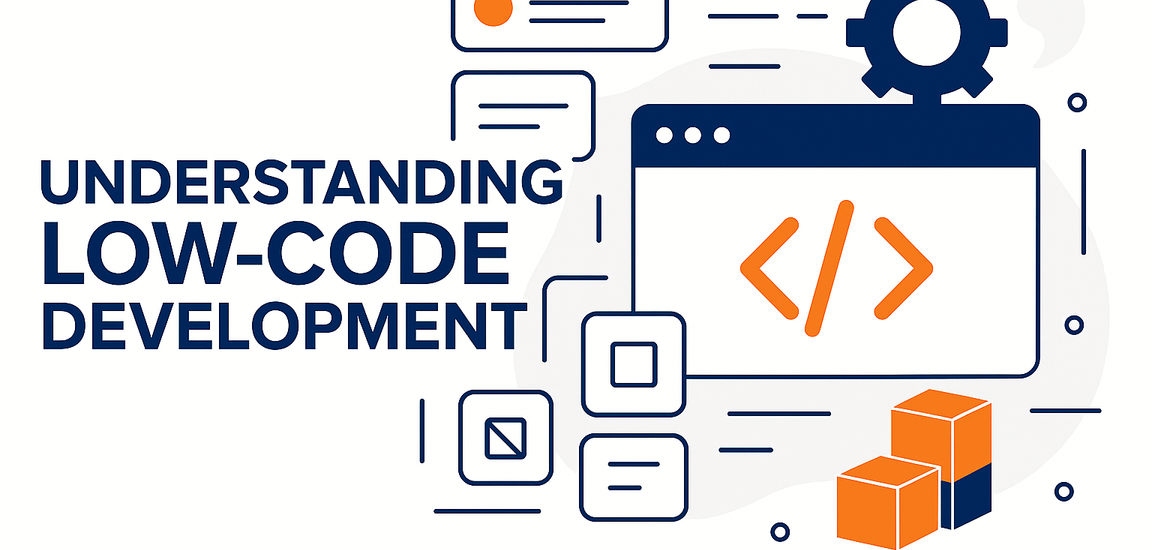By Elijah Young
Categories: Low-Code Development / Power Platform & Automation / Business Transformation
Let me explain low-code development. It’s an approach to building applications that uses visual tools and pre-built components instead of writing everything from scratch in code. Sounds simple, right? But it’s changing how organizations build software.
I’ve seen teams transform their development process using low-code platforms. They build applications faster. They involve more people in the process. They respond to changing business needs without waiting months for traditional development cycles.
Let me break down what low-code development is, why it matters, and how it can transform your business.
What is Low-Code Development?
Low-code development is a way of building applications using visual, drag-and-drop interfaces instead of writing code line by line. Think of it like this: Instead of building a house by cutting every board yourself, you’re using pre-made components and assembling them visually.
The “low-code” part means you still might write some code for custom logic or complex features, but most of the application is built using visual tools. It’s a middle ground between traditional coding (where you write everything) and no-code platforms (where you don’t write any code at all).
Low-code platforms provide pre-configured modules, logic, templates, and connectors that you can customize and extend. Professional developers can add custom code when needed. Business users can build simple applications without coding at all. Everyone works together.
Why Low-Code Development Matters
Here’s what makes low-code development valuable:
It accelerates development. You can build applications much faster than traditional coding methods. What used to take months can take weeks. What used to take weeks can take days. The visual tools and pre-built components eliminate a lot of repetitive work.
It reduces costs. You minimize the need for extensive coding expertise. You don’t need as many highly specialized developers. Business users can build some applications themselves. This reduces development costs and speeds up delivery.
It empowers more people. Non-developers can participate in app creation. Business analysts, process owners, and subject matter experts can build solutions themselves. This fosters innovation because the people who understand the problems can build the solutions.
It’s flexible. You can easily adapt to changing business needs. When requirements change, you can modify applications quickly. You’re not locked into long development cycles. You can iterate and improve based on feedback.
It improves collaboration. Low-code platforms break down silos between IT and business teams. Business users can build prototypes. IT teams can refine and extend them. Everyone speaks the same visual language.
How Low-Code Development Transforms Businesses
When organizations adopt low-code development, they typically see three big changes:
Innovation accelerates. You can rapidly prototype and iterate on new ideas. When someone has an idea for solving a business problem, they can build a working prototype quickly. You can test concepts before committing to full development.
Collaboration improves. The barriers between IT and business teams start to break down. Business users can build applications themselves. IT teams can focus on complex integrations and custom code. Everyone contributes.
Agility increases. You can respond swiftly to market changes and customer demands. When a new requirement comes up, you can build a solution quickly. You’re not waiting months for traditional development cycles.
Visual Modeling and Development
Here’s what makes low-code platforms different: They elevate coding from textual to visual. Instead of writing code in a text editor, you build applications through a model-driven, drag-and-drop interface.
Think of it like building with LEGO blocks. You have pre-made pieces (components, modules, connectors) that you can snap together visually. You can see how everything connects. You can understand the flow of your application by looking at it.
This approach democratizes app development. Professional developers can work faster. Novice developers can build applications without deep coding knowledge. Business stakeholders can build simple solutions themselves. Everyone collaborates effectively.
Low-code platforms offer pre-configured modules, logic, templates, and connectors that can be customized and extended by skilled developers. This accelerates development and ensures consistency and scalability across applications. You’re not reinventing the wheel every time.
Reusable Components and Extensibility
One of the powerful aspects of low-code development is reusable components. You build something once, and you can use it everywhere. A component for user authentication. A component for data validation. A component for sending notifications.
Once you build these components, they become part of your library. Other developers can use them. Other applications can use them. You ensure consistency across your organization while speeding up development.
But here’s the key: Low-code platforms are extensible. Skilled developers can add custom code when needed. If you need complex logic that the visual tools can’t handle, you can write code for that specific part. You get the speed of visual development with the power of custom code when you need it.
Low-Code vs. No-Code
You might be wondering: What’s the difference between low-code and no-code?
No-code platforms let you build applications without writing any code at all. Everything is visual. Everything is drag-and-drop. These are great for simple applications, workflows, and automations. But they’re limited. If you need something the platform doesn’t support, you’re stuck.
Low-code platforms offer more flexibility. You can build most of your application visually, but you can also write custom code when needed. This makes low-code suitable for a broader range of applications, from simple productivity tools to complex enterprise systems.
Think of it like this: No-code is like using a template. Low-code is like using a template but being able to customize it however you want.
When to Use Low-Code Development
Low-code development works well for:
Rapid prototyping. When you need to test an idea quickly, low-code platforms let you build a working prototype in days instead of months.
Business process automation. When you need to automate workflows or build applications that support specific business processes, low-code platforms are perfect.
Internal tools. When you need to build tools for your team, low-code platforms let you build exactly what you need without the overhead of traditional development.
Integration applications. When you need to connect different systems and create workflows between them, low-code platforms excel.
Customer-facing applications. When you need to build applications for customers, low-code platforms can handle it, especially with the ability to add custom code for complex requirements.
The Future of Low-Code Development
Low-code development is set to revolutionize digital transformation. As organizations seek to modernize legacy systems and enhance customer experiences, low-code platforms will play a pivotal role in driving innovation and efficiency.
Here’s why: The demand for software is growing faster than the supply of developers. Low-code platforms help bridge that gap. They enable more people to build applications. They speed up development cycles. They reduce costs.
But more importantly, low-code platforms enable rapid, iterative, and collaborative application design. You can build something, test it, get feedback, and improve it quickly. This iterative approach leads to better solutions because you’re learning and adapting as you go.
Getting Started with Low-Code Development
If you’re thinking about adopting low-code development, here’s what I’d suggest:
Start with a specific problem. Don’t try to rebuild everything at once. Pick one process or one application that’s causing pain. Build a low-code solution for that first.
Choose the right platform. Different low-code platforms have different strengths. Some are better for business users. Some are better for developers. Some integrate better with your existing systems. Do your research.
Train your team. Low-code platforms are easier to learn than traditional coding, but they still require training. Invest in helping your team understand how to use the platform effectively.
Establish governance. Even though low-code makes development easier, you still need governance. Who can create applications? What standards do they need to follow? How do you ensure security and compliance?
Start small, scale gradually. Build one application. Learn from it. Build another. As your team gets comfortable, you can tackle more complex projects.
The Bottom Line
Low-code development is not just a trend. It’s a transformative approach that empowers businesses to innovate and adapt in a rapidly changing digital landscape.
It accelerates development. It reduces costs. It empowers more people to build applications. It improves collaboration between IT and business teams. It increases organizational agility.
But here’s the thing: Low-code development isn’t about replacing professional developers. It’s about enabling more people to solve problems with technology. It’s about moving faster. It’s about building solutions that fit how your business actually works.
The question isn’t whether low-code development is powerful enough. It is. The question is: What problem do you want to solve first?
Start there. Build one low-code solution. See how it works. Then build another. Before you know it, you’ll have transformed how your organization develops applications.






